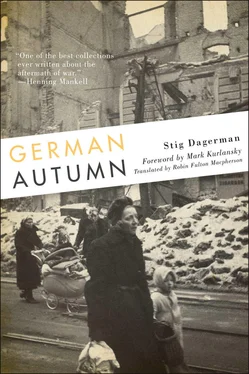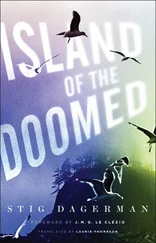Of the cruelties of the past practised by Germans in and out of Germany, there can be only one opinion, since of cruelty in general, of whatever kind and whoever practises it, there can be only one opinion. But it is another matter to ask if it is now right, if it is not indeed a cruelty, to regard the sufferings of the Germans as justified on the ground that they are the undoubted results of a German war of aggression that failed. Even from a judicial point of view such an argument is quite untenable because the German distress is collective whereas the German cruelties were, despite everything, not so. Further, hunger and cold are not included among the indictable offences of legal justice, for the same reason that torture and abuse are not, and a moral judgement that condemns the accused to an inhuman existence — that is to an existence which lowers rather than raises the human worth of those who are judged — denies what ought to be the unspoken object of earthly justice and has itself removed the basis for its right to exist.
The principle of guilt and retribution could acquire at least an appearance of justification if those in judgement were themselves to adhere to a principle directly contrary to that which has resulted in this autumn’s being for most Germans a cold, rainy and ruinous hell. That is not the case: the collective accusation directed at the German people involves obedience in absurdum, obedience even in cases where disobedience would have been the only humanly justified response. But isn’t obedience itself ultimately what designates the individual’s relation to authority in every state in the world? Not even in the mildest of authoritarian states can it be avoided that the citizen’s duty of obedience to the state may collide with his duty of love or respect for those closest to him (the bailiff who throws a family’s furniture on the street, the officer who lets a subordinate die in a battle that does not concern him). What is, in the last resort, essential is the recognition in principle of the enforcement of obedience. Once this is admitted then it is soon clear that the state which demands obedience has at its disposal the means of compelling obedience even in the refractory. Obedience to the state is indivisible.
The journalist who backed out of the waterlogged cellar in the Ruhr is therefore, to the extent that his reaction is conditioned by conscious moral principle, an immoral person, a hypocrite. He considers himself a realist, but no one is less of a realist than he is. With his own ears he has heard the hungry family say that they were better off under Hitler. When he has heard many other families in many other and perhaps somewhat more habitable cellars and rooms make the same admission he draws the conclusion that the German people are still infected by Nazism. His lack of realism here consists in the fact that he regards the Germans as one solid block, irradiating Nazi chill, and not as a multitude of starving and freezing individuals. He is particularly offended by the answer to his elaborate question because he considers it the duty of the German cellar-people to extract political lessons from the damp of their cellars, from TB, from the lack of food, clothes and warmth: the lesson that Hitler’s politics and their own participation in the way they were carried out caused their ruin, and brought them down to this waterlogged cellar. Whatever the truth of this, the mere presentation of the matter in such terms indicates an absence of both realism and psychological insight.
People demanded of those who were suffering their way through this German autumn that they should learn from their misfortune. No one thought that hunger is a very bad teacher. Anyone who is properly hungry, and helplessly so, does not upbraid himself for his own hunger: instead, he upbraids those from whom he thinks he could have expected help. Nor does hunger encourage investigation into the web of causes: anyone who is permanently hungry does not have the strength to find connections beyond the most immediate, which means in this case that he upbraids those who brought down the regime which previously met his needs and who are now meeting those needs less adequately than he was accustomed to.
This is of course not a particularly ‘moral’ line of thought, but hunger has nothing to do with morality. ‘Erst kommt das Fressen, dann die Moral …’ The Threepenny Opera was staged in various places in Germany during this autumn and was met with enthusiasm, but with a different kind of enthusiasm from before: what had been seething social criticism, a pungent open letter calling for social responsibility, was transformed into a celebration of social irresponsibility.
War is an equally inept teacher. When one tried to quizz the cellar-German on what the war had taught him, the answer was not — alas — that it had taught him to hate and despise the regime that had brought it about, for the simple fact is that perpetual fear of death has only two things to teach: to be afraid and to die.
The situation in which the visitor in the autumn of 1946 found the German people was such that it was a moral impossibility to extract any conclusions at all about its ideological attitude. For hunger is a form of unaccountability, not just a physical but also a mental state that leaves minimum space for the leisure of thought. This meant that one naturally heard things which sounded most unattractive but which nevertheless gave one no right to make cocksure prognoses. In my own case I heard nothing more repellent than the declaration of a Hamburg bank director who believed that the Norwegians should in spite of everything be grateful for the German occupation because it had given them a whole series of mountain-roads…
Apathy and cynicism (’… dann kommt die Moral’) were two conditions which marked the reaction to the two most important political events — the executions in Nuremberg and the first free elections. The people of Hamburg stood in grey crowds before the placards announcing that the death sentences had been carried out. No one said a word. People read, and passed on. People did not even look serious, just indifferent. True enough, in a girls’ high school in Wuppertal the pupils wore mourning on 15 October; in Hamburg during the night someone had painted ‘Shame Nürnberg’ in huge letters; and in an underground station in front of a poster showing a bombing raid a man grasped my arm and hissed: ‘Those who did that won’t be condemned.’ But the exceptions only stressed the general indifference. In a deathly silent Berlin, 20 October, the first day of the free elections, looked like all the other dead Sundays. There was not the slightest trace of enthusiasm or joy in the crowds of deathly silent voters.
Throughout that autumn there were elections in various places in Germany. Participation was perhaps surprisingly active but political activity limited itself to voting. And the situation was such that conclusions based on the outcome had to be drawn with the greatest care. A Social Democratic victory and a Communist defeat — two clear facts but far from being as clear as they would be in a normal society. The Social Democratic election propaganda engaged itself strongly with foreign affairs, meaning the Soviet Union, while the Communist variety was busy with domestic problems, meaning bread. Given the conditions in the cellars, it is wrong to suppose that the results indicated a democratic instinct in the German people but right to suppose that fear was patently stronger than hunger.
Just as it is wrong to draw general conclusions about the hold of Nazism on Germans on the basis of bitter sneers thrown from German cellars, so must it be equally wrong to mention the word ‘democracy’ in connection with the voting figures of this German autumn. If you are living at the edge of starvation then your first interest is in fighting not for democracy but to distance yourself as far as possible from that edge. The question really is whether the free elections did not come much too soon. As a training exercise in democracy they were quite meaningless because they were offset by so many significant and negative factors on the level of foreign affairs: the limited area of manoeuvre available to the politicians meant that the elections came to be regarded by the sceptics with distrust, as a tactical dodge on the part of the Allies to divert criticism of the supply situation from the Allied to the German authorities. A lightning-conductor and nothing else. The conditions for democracy consisted not in free elections but in an improved supply of provisions, an existence with hope in it. All that made this existence more hopeless — reduced rations and the contrast with the well-being of the Allied soldiers, the clumsy dismantling operations where the confiscated material was left to lie rusting in the autumn rains, the practice of making five German families homeless to make space for one Allied family, and above all the attempt to eradicate militarism by means of a military regime, to try to foster contempt for German uniforms in a country swamped by Allied uniforms — all that helped to make the soil for democracy more sterile rather than more favourable, when the latter ought to have been the obvious preference.
Читать дальше












